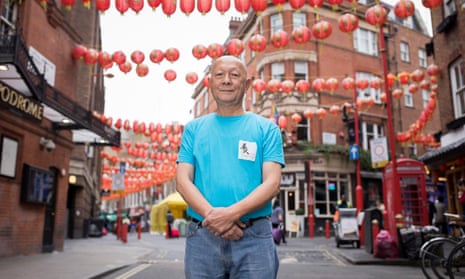A man like Yuk Luzn Man simply does not retire. From the age of 14, Man always worked. In his twenties he moved to the UK from Hong Kong to work in his brother’s fish and chip shop in Southend. His memories of that time are of a permanent, fugue-like exhaustion borne of 12-hour days behind the counter, interrupted only by sleep.
Later, Man worked as a chef at Chinese restaurants across the country: in Manchester, Crawley, Norwich. His last job in catering was at a casino restaurant in Southend. It paid only the minimum wage and the hours were bad – 6pm-2am – but there weren’t many other jobs available. In 2015, at the age of 66, Man finally retired. A lifetime of hard work, with burning shoulders, aching feet and wrists sore from endless chopping, was finally at an end. Man could relax.
He lasted two months.
“I’d wake up in the morning,” he says, “and think, what should I do today?” Even though Man was now living in London, he would drive to Southend to catch up with his old colleagues at the casino – but most of the time they were too busy to hang out.
Which is how Man found himself volunteering three days a week at the London Chinese Community Centre, a maze of rooms overlooking Leicester Square. Now 72, Man does whatever jobs the centre asks of him, without complaint.
“I always have a list,” laughs manager Beverley Lin. “He might roll his eyes but he’ll always do it all.” Man cooks food for the centre’s lunch club. He does odd jobs, like setting up rooms for classes, and even hanging pictures. He answers emails. He paints walls, although he finds that task particularly boring. He is, by a million miles, Lin’s most hardworking volunteer. “A lot of volunteers will call two minutes before they’re supposed to arrive to say they can’t make it,” says Lin. Never Man. “If he says he’s here, he’s here. I don’t have to worry.”
Too much leisure time, Man thinks, is bad for the soul. It’s better to keep busy. “I’m helping others,” he says, “but in a way I’m helping myself.”

Man was born in Hong Kong, the sixth of 13 children. His parents ran a grocery store but money was tight. Man was pulled out of school at 14, but wasn’t too bothered about finishing his education. “I didn’t work hard at school,” he laughs. “I wanted to go out and make money.”
When he arrived in the UK in 1975, the first thing he noticed was the cold. And the church bells: it seemed like everyone went to church on Sunday. At weekends, the streets were quiet compared with the bustle of Hong Kong. There was racism, of course. “Older people,” he says, “when they walked past me, they’d spit. Not at me. But next to me.”
In his heart, Man still feels like a Hongkonger. He misses his siblings at home, and the community centre helps him feel connected. The centre was founded in 1980 primarily as a place where immigrants from Hong Kong – hardly any other Chinese people were able to move to the UK at that time – could get support with translating legal documents and accessing benefits.
With successive waves of migration – including students from China coming to study at British universities – the centre’s remit has expanded. It helps diaspora kids connect with their heritage; it’s a social hub for the older generation; and it assuages university students’ homesickness. Man is a sort of authority figure. He chastises the elders when they gossip about other members. “I remind them,” Man says, “that it’s not good to speak in that way.”
During the pandemic, the centre’s role was more critical than ever. Many of the older members lived alone – heartbreakingly, Lin’s team discovered some of them dead in their homes from the virus – and there was a wave of anti-Asian hate crime. “The centre is very important for people’s wellbeing – especially the elderly members,” Man says.
Man has rarely earned above the minimum wage, and when he had cash in his pocket, he had no time to spend it. “I always had to work,” he says, “and didn’t have time to do anything. Now I have time, but don’t have the money!” He has always wanted to try the Royal China restaurant in Canary Wharf, which is famous for its dim sum.
The Royal China offered Man a £100 voucher, which the Guardian matches, and he headed there one evening in late October for a special meal. Man had hoped to take his wife, but she had a cold, so Man, Lin and other volunteers from the centre enjoyed some of London’s finest Chinese food. “I loved the location and the meal,” says Man. “The food was fantastic. Especially the peking duck and stir-fried beef.” Ever the chef, even in retirement, Man explained how each dish was made, to the amusement of his dining companions.
Lin relished the opportunity to get to know her most faithful volunteer better. “He talked about all the places he grew up,” says Lin, “and what it was like, and what he did as a child. It was so nice, to spend some time together away from the centre.”
Want to nominate someone for Guardian angel?
Email us – with their permission – and suggest a treat at guardian.angel@theguardian.com
